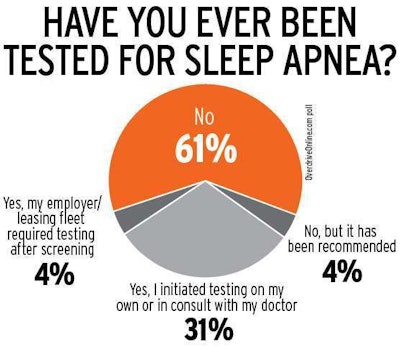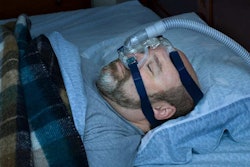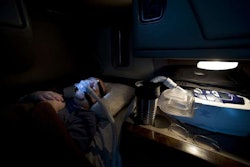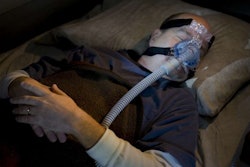
A commenter under my post on sleep apnea screening protocol from last week Friday got me thinking about the reality that, as regards sleep apnea, a one-size-fits-all screening process like the various protocols that have been recommended over many years by the Federal Motor Carrier Safety Administration’s Medical Review Board and others will never be a perfect substitute for individuals’ one-on-one medical consultations as a general rule.
Screening criteria like the recently discussed procedures, for instance (preliminary recommendations in that case, mind you, not set in stone and a very long way from implementation, if any), are set so broadly to refer individuals for testing that to a lot of observers it looks like a gold mine for false-positive-type situations — scads of drivers would be referred for testing, benefiting the apnea-testing labs and with a big expense hole for a the drivers referred.
“This is just a cash cow for doctors and manufacturers” of medical equipment, wrote reader Yote Anders under my last post on the subject.
(We’re still open to responses from any who’ve not run through our survey, available via this link, to see whether those preliminary recommended criteria might in fact cause you to be referred for apnea testing.)
But even those broad draft criteria, as the aforementioned commenter’s note suggests, would not by themselves cause all apnea sufferers to be referred for testing. The commenter’s case actually suggested a “false-negative” screening situation as it might apply to him:
I have sleep apnea. Quite frankly, having a [CPAP] machine saved my life. I got checked out when I was having trouble staying awake during the day and dozing while driving. I was not driving truck when diagnosed. My latest doctor told me being overweight has no bearing on sleep apnea. It doesn’t help, but is not a causality. My doctor even uses a machine, and he’s not overweight in the least. Unfortunately, what the government is doing is generalizing the condition. [Recent preliminary recommended screening] criteria is flawed. Will they find a lot of people with it? Most likely. A simple question checklist, answered honestly, will find more true cases than anything else. But then, who’s going to be “honest” and put their job on the line. … I know this can be debated back and forth until the end of time, but bottom line, others lives are at risk by having true sleep apnea and not being treated. —SKelly1, via comments at this link.
How many others out there are in Kelly’s or his doctor’s situation relative to apnea? How common are both false-positive and -negative situations when screening for apnea? This poll gets at some of those questions — what’s been your experience, if relevant, in apnea screens:
More importantly, perhaps, the commenter’s situation also underscores the importance of a good relationship with a doctor outside the medical certification process, likewise listening to what your body is telling you. As an on-highway driver, if something is wrong with your sleep, you will most certainly know it if you are listening. And as I’ve written before, it’s paramount to have someone you can trust to give you solid medical advice in that situation, without your livelihood hanging in the balance.










